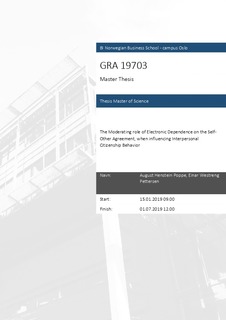The Moderating role of Electronic Dependence on the SelfOther Agreement, when influencing Interpersonal Citizenship Behavior
Master thesis

Permanent lenke
http://hdl.handle.net/11250/2621410Utgivelsesdato
2019Metadata
Vis full innførselSamlinger
- Master of Science [1621]
Sammendrag
In this study, we investigate through a quantitative approach, whether electronic
dependence had a significant influence on the relationship between self-rated
and other-rated leadership. The impact on the relationship was further seen in
relation to the follower outcome, known as interpersonal citizenship behavior
(Settoon & Mossholder, 2002). The leadership-style for this study was
represented by two facets of Transformational Leadership, which were
Individual Consideration and Intellectual Stimulation (Yukl, 2013; Schieltz,
2018; Pasovska & Miceski, 2018). The relationship between self-rated and
other-rated leadership was explained by the Self-Other Agreement (Atwater &
Yammarino, 1992). Lastly, Electronic Dependence was represented by written
IT-communication tools (Gibson & Gibbs, 2006; Dulebohn & Hoch, 2017).
Even though there were numerous studies on TFL, SOA, and ICB, the current
research was considered lacking important knowledge on the influential role of
electronic dependence. The findings showed that there was no direct influence
from self-rated TFL on follower ICB. Further, the relationship between otherrated
TFL and ICB gained support, which showed a relation between how
followers perceive their leader and how they perform at work. The assumptions
of self-rated TFL being mediated by other-rated TFL, influencing ICB, were not
supported at all. Lastly, the moderating role of ED was supported, concerning
IC-related behavior, when impacting person-oriented ICB.
Beskrivelse
Masteroppgave(MSc) in Master of Science in Leadership and Organizational Psychology - Handelshøyskolen BI, 2019